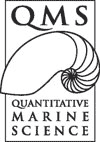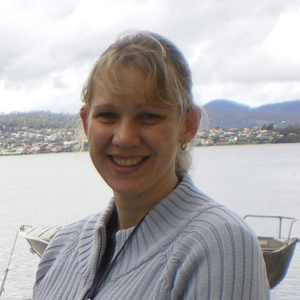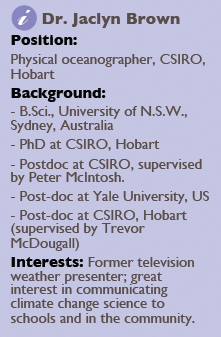

I began my maths degree thinking that I would like to earn lots of money and work in a bank. I did a course at university in oceanography and the lecturer explained that it is possible to understand how the ocean behaves just by using mathematics and physics. I thought that was pretty incredible!
You can generate wave equations and through observation data taken at sea exactly what you predicted can be occurring. But there is a more compelling reason to study oceanography – to better understand climate. Climate change is more than just the global warming issue. It is also doing predictions for farmers to let them know how the seasons are shaping up, and what they can expect by way of rainfall. In Australia seasonal forecasting is a serious and substantial research field. When you get up in the morning you feel that you are doing something that is important to the world.
 Why a PhD?
Why a PhD?PhDs are very challenging; they can be one of the hardest things you will do in your life primarily because you are often insecure about your abilities to do it. But there is a lot of freedom in a PhD to just learn and I love learning! You learn not just what you are studying but you also learn how to think and how to ask good questions, questions that you can find answers to, questions that are interesting to the community and for which the community is seeking answers.
It is a very good life style. There is the opportunity to travel and meet many really amazing people. I love the conferences; it's the best bit of the job. I travel overseas at least once a year.
CSIRO in Hobart is one of the best places in Australia to do a PhD. You are on the edge of the Southern Ocean, surrounded by some of the best oceanographers in the world with great resources and a supportive environment - it is fantastic! If you want to go to sea there are opportunities for that too. But with the computing resources, libraries and the critical mass that comes from several research institutions being in the one city, you can't really ask for a better place to study.
Standing of living in Hobart is much better than in Sydney and Melbourne. You get the same amount of money no matter where you live, it is much easier to live in Hobart where the rent is less and food is less. And it's a great environment if you want to do something outdoors.
QMS is a great opportunity to focus on oceanography and to be a part of both the University of Tasmania and CSIRO. You also get to do coursework, which could be useful. The other advantage is that you are with a large group of students experiencing and confronted with the same issues as you are.
Trevor is fun to work with and he is an excellent mentor. He views your career in the total picture: meeting the right people, going to the right places, encouraging you to think differently about a project.
Anaïs van Ditzhuyzen